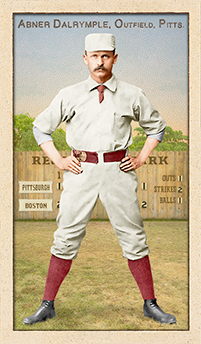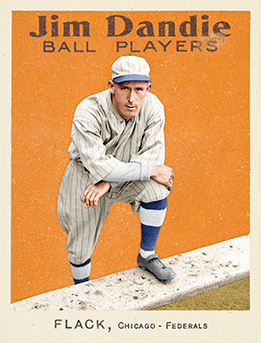
- Series: Jim Dandie Feds
- City: Chicago
- Team: Whales
- League: Federal League
Max John Flack (1890-1975) was a left-handed outfielder who played a dozen seasons in the majors in Chicago and St. Louis. He compiled a career average of .278 with little power but considerable speed, stealing 200 bases over his tenure. In recent years a shadow has been cast over this journeyman's reputation as his status as the “goat” of the 1918 World Series has been looked at in more sinister terms with the uncovering in 2007 of documents pertaining to the Black Sox scandal. An affidavit by Ed Cicotte indicates he and his wayward teammates felt “inspired” by the Cubs' loss to Boston the year before. Flack's dubious performance in the Series made him an object of suspicion. He remains the only player to be picked-off twice in a World Series game. His throwing error in game six provided the margin of victory to Babe Ruth's Sox. However, a review of the box scores for the '18 Series shows the Cubs were charged with six errors and Flack committed only the one that led to Boston's only scores in the finale (in the third inning). There were a number of noteworthy aspects to that Series beyond speculation of misconduct. Due to the war, it became the only Fall Classic to be played entirely in September. The Cubs eschewed their home park (later to be named Wrigley Field) in favor of vaunted Comiskey Park (“The Baseball Palace of the World”). Although it would not be named the national anthem until 1931, game one was graced with the first performance of the Star Spangled Banner at a major league game. And, of course, it would be mourned by Boston fans for another 86 years as the last championship as the Curse of the Bambino took hold. So, if Max did engage in mischief, he did so on a grand stage, but there is nothing but unfortunate circumstance to implicate him.
- Flack had debuted with the Federal League's Chicago “Chi-Feds” (later the Whales) in 1914
- He remained in town with the Cubs following the demise of the upstart league the next year, playing regularly for six seasons before moving to the Cardinals as a reserve for four more
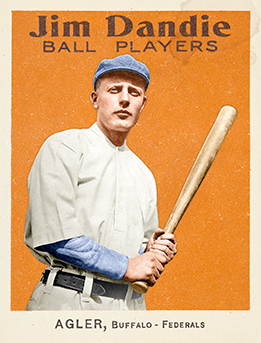
- Series: Jim Dandie Feds
- City: Buffalo
- Team: Blues (FL)
- League: Federal League
Joseph Abram Agler (1887-1971) was a first baseman/outfielder from Coshocton, Ohio who debuted with the Washington Senators at the end of the 1912 season after several years in the minors. He had started out in professional ball with Lansing of the Southern Michigan League in 1907. He then played for Canton, Newark, Atlanta and Jersey City before finally getting a late-season try-out in D.C. His long-awaited opportunity failed to gain Joe a spot on the Senators' 1913 team and he returned to the Atlanta Crackers. He got his big chance at “major league” glory when the Federal League opened for business in 1914.
The Federal League of Base Ball Clubs had incorporated in '13 under the auspices of John T. Powers who dangled the prospect of avoiding the hated reserve clause as an inducement to recruit disgruntled big-leaguers. Dubbed an “outlaw” enterprise by the AL and NL, the experiment was doomed to fail. Nevertheless, players such as Agler benefited by the expanded rosters and short-lived salary surges. He got his opportunity with the Buffalo Buffeds in 1914, playing 135 games and hitting a respectable .272. Dealt to the Baltimore Terrapins in the middle of the 1915 season, Joe improved a bit on the poor average that prompted Buffalo to give up on him. He hit only .178 for the Buffeds but batted .215 for Baltimore. His overall average in his three partial years in the majors was .246, not much below his minor league average of .258 showing modest but steady ability.
- The Federal League may have been a brief actor on the major league stage but it left some indelible marks on the game. The Terrapins caused such a financial crisis for the across-the-street Orioles that the team had a fire sale which included sending a young kid named Ruth to Boston.
- Wrigley Field was built for the Federal's Chicago Whales and still stands as a monument to the brash entrepreneurial spirit that built the national pastime
- Litigation in the wake of the Federal League also sealed the monopoly still enjoyed by MLB as the Supreme Court ultimately ruled it was exempt from the Sherman Antitrust Act
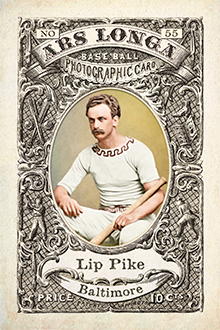
- Series: Pioneer Portraits I: 1850-1874
- City: Baltimore
- Team: Canaries
- League: National Association (NAPBBP)
Lipman Emanuel Pike (1845-1893) has many claims to fame as one of the most prodigious power hitters of early baseball. He was one of the first to be paid to play, he was a perennial field general on some of the best teams of his era, he hit some of the longest home runs in the earliest parks, he was one of the first players blacklisted, he was one of the fastest players of his time. And, if not the first, he was certainly the first Jewish player of note in the game. Pike came up in the infancy of baseball and starred for the great early clubs: The Brooklyn Atlantics, Philadelphia Athletics, NY Mutuals and the Irvington NJ nine. A solid all-around player, the southpaw even held his own at second and short. Movie-idol handsome, Lip always made his team look good. And he made a lot of teams look good. A lifelong itchy foot led Pike to change clubs as often as some players changed spikes. He never lasted more than two seasons with any franchise. In an era when home runs were scarce, Lip was one of the top sluggers. In 1883 Sporting Life documented a remarkable artifact of Pike's power. With the demolition of Brooklyn's old Union Grounds, the writer described the “pagoda” that had stood in right center from which rose an iron rod, bent from a ball struck by Pike and preserved as a cherished icon. Later research indicates Pike's HR slammed that rod 40 feet above the ground and about 360 feet from home plate hard enough to bend iron - in the deadball era.
- Pike, with eight others, was ousted by the NL owners in 1881 for suspicion of throwing games
- Out of the game, Pike returned to his family haberdashery in NY where he perished from heart disease at age 48. His renown persisted for decades, leading to one vote in the first HOF ballot in 1936
- Series: Beginnings: 1880's
- City: Pittsburgh
- Team: Alleghenys
- League: National League
Abner Dalrymple (1857-1939) was one of the most prolific hitters of the fledgling NL. He was the leadoff batter for 8 straight years (with 5 pennants) for the Chicago White Stockings, contributing to a team home run record in 1884 that stood until eclipsed by the ’27 Bronx Bombers. He hit over .300 six times.
- Still shares a record for 4 doubles in 4 at-bats, July 3, 1883
- A.G. Spalding paid $2500 (!) to get Dalrymple from the Milwaukee Grays in 1878
- Dalrymple earned that confidence, winning the NL batting title in his rookie year
- In 1881 became first ever batter to be intentionally walked with bases loaded
- Dalrymple's uniform color in this card was changed from blue to red in August, 2017 to reflect recent reliable research conducted by Craig Brown and friends at Threads of Our Game. Two cards were previously released featuring a blue uniform
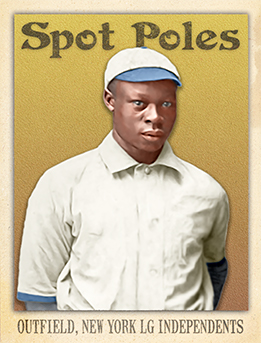
- Series: Diamond Heads '15
- City: New York
- Team: Lincoln Giants
- League: Independent
Spottswood Poles (1889-1962) was ranked by renowned athlete and singer Paul Robeson as one of the four most talented black athletes of the first half of the 20th century, along with Jesse Owens, Joe Louis and Jack Johnson. Fast company for a fleet-footed outfielder who was once timed in a sub-ten-second 100 yard dash. Spot was raised in Harrisburg, PA and came up with the sports clubs for colored kids. His talent led him to debut with Sol White's Philadelphia Giants in 1909. He was a hit. And could he hit: averaging well over .400 for four seasons. He followed his mentor to New York's Lincoln Giants and remained with various NY clubs until returning to Philly and Ed Bolden's Hilldale Club. Some highlights of his time with the Lincolns included defeating Rube Foster's powerhouse Chicago American Giants and proving his mettle against all competition, including getting three straight hits off Grover Cleveland Alexander in one of the exhibition games played against major league teams. Spot enlisted with the 369th Infantry Regiment, dubbed by their German foes the Hellfighter Regiment for their implacable defense (never giving up a trench or a yard of battlefield), and earned five battle stars and a Purple Heart. The 369th was the first African American unit in WWI and was assigned to the French forces who knew them as “The Men of Bronze”. They called themselves the Harlem Hellfighters. After the war, Poles knocked around before settling back with Hilldale.
- Playing in Cuban and Negro ball, Poles is cited in some sources as averaging over .400 lifetime, a stat not corroborated by Baseball Encyclopedia. Suffice to say, he was one of the best hitters of his or any era
- John McGraw pegged Spot as one of four black players he'd have put in the majors, with Pop Lloyd, Smokey Joe Williams and Cannonball Dick Redding
- The decorated war hero is buried in Arlington National Cemetery with his wife Bertha



